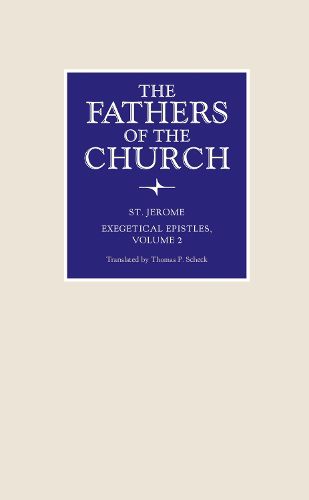Readings Newsletter
Become a Readings Member to make your shopping experience even easier.
Sign in or sign up for free!
You’re not far away from qualifying for FREE standard shipping within Australia
You’ve qualified for FREE standard shipping within Australia
The cart is loading…






This is the second of a two-volume set that includes Thomas Scheck's new translations of several of St. Jerome's previously untranslated exegetical letters. Epistle 85 to St. Paulinus of Nola contains Jerome's answers to two questions: how Exodus 7.13 and Romans 9.16 can be reconciled with free will, and what 1 Corinthians 7.14 means. Epistle 106 to Sunnias and Fretela, which deals with textual criticism of the Septuagint, consists of a meticulous defense of Jerome's new translation of the Latin Psalter. Epistle 112 is a response to three letters from St. Augustine: Ep. 56 (contained in the previous volume), Ep. 67, and Ep 104. In the face of Augustine's criticisms, Jerome defends his own endeavor to translate the Old Testament directly from the Hebrew text. He also vindicates his own ecclesiastical interpretation of Galatians 2.4-11, as he had set this forth in his Commentary on Galatians, and along the way he accuses Augustine of advocating the heresy of Judaizing. Epistle 119 to Minervius and Alexander contains Jerome's answers to some eschatological questions regarding the interpretation of 1 Corinthians 15.51 and 1 Thessalonians 4.17. In Epistle 120 to Hedibia, Jerome tackles twelve exegetical questions that focus on reconciling the discrepant Resurrection accounts in the Gospels, as well as questions about Romans 9.14-29, 2 Corinthians 2.16, and 1 Thessalonians 5.23. In Epistle 121 to Algasia, Jerome clarifies eleven exegetical questions dealing with passages in the Gospels and Paul's letters (Romans 5.7; 7.7-25; 9.3-5; Colossians 2.18-19; 2 Thessalonians 2.3). This letter also contains an exposition of the parable of the unjust steward (Luke 16.1-10), in which Jerome translates material from a commentary attributed to Theophilus of Antioch. In Epistle 129 to Dardanus, Jerome interprets "the promised land" and discusses the alleged crimes of the Jews. Epistle 130 to Demetrias is not an exegetical letter but an exhortation to the newly consecrated virgin on how to live out her vocation. In this letter Jerome reflects on Origenism and Pelagianism. Finally, in Epistle 140 to Cyprian the presbyter, Jerome expounds Psalm 90.
$9.00 standard shipping within Australia
FREE standard shipping within Australia for orders over $100.00
Express & International shipping calculated at checkout
This is the second of a two-volume set that includes Thomas Scheck's new translations of several of St. Jerome's previously untranslated exegetical letters. Epistle 85 to St. Paulinus of Nola contains Jerome's answers to two questions: how Exodus 7.13 and Romans 9.16 can be reconciled with free will, and what 1 Corinthians 7.14 means. Epistle 106 to Sunnias and Fretela, which deals with textual criticism of the Septuagint, consists of a meticulous defense of Jerome's new translation of the Latin Psalter. Epistle 112 is a response to three letters from St. Augustine: Ep. 56 (contained in the previous volume), Ep. 67, and Ep 104. In the face of Augustine's criticisms, Jerome defends his own endeavor to translate the Old Testament directly from the Hebrew text. He also vindicates his own ecclesiastical interpretation of Galatians 2.4-11, as he had set this forth in his Commentary on Galatians, and along the way he accuses Augustine of advocating the heresy of Judaizing. Epistle 119 to Minervius and Alexander contains Jerome's answers to some eschatological questions regarding the interpretation of 1 Corinthians 15.51 and 1 Thessalonians 4.17. In Epistle 120 to Hedibia, Jerome tackles twelve exegetical questions that focus on reconciling the discrepant Resurrection accounts in the Gospels, as well as questions about Romans 9.14-29, 2 Corinthians 2.16, and 1 Thessalonians 5.23. In Epistle 121 to Algasia, Jerome clarifies eleven exegetical questions dealing with passages in the Gospels and Paul's letters (Romans 5.7; 7.7-25; 9.3-5; Colossians 2.18-19; 2 Thessalonians 2.3). This letter also contains an exposition of the parable of the unjust steward (Luke 16.1-10), in which Jerome translates material from a commentary attributed to Theophilus of Antioch. In Epistle 129 to Dardanus, Jerome interprets "the promised land" and discusses the alleged crimes of the Jews. Epistle 130 to Demetrias is not an exegetical letter but an exhortation to the newly consecrated virgin on how to live out her vocation. In this letter Jerome reflects on Origenism and Pelagianism. Finally, in Epistle 140 to Cyprian the presbyter, Jerome expounds Psalm 90.